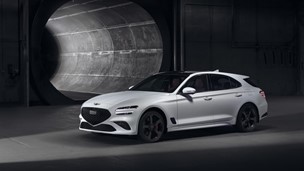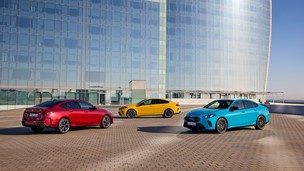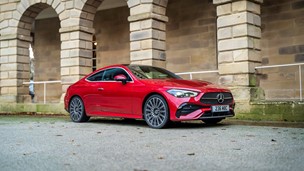I once drove a Volvo V70 DRIVe from Marlow in Bucks to Milan on one tank of fuel - and how many people can say that?That it's possible at all was thanks to Volvo's efficient 1.6-litre turbodiesel engine - now updated with stop-start technology alongside with a raft of aerodynamic and power-saving tweaks. Yup, you read right - Volvo has kitted out this famed behemoth of a car with a weedy 1540cc diesel engine.That may sound counter-intuitive - or a particularly Swedish hair shirt - but it's really not, and it's to Volvo's credit that they've made such a small engine in such a large car work at all.In the revised V70 DRIVe you get a 115bhp 1.6-litre turbodiesel unit that emits a paltry 119g/km of carbon dioxide - a figure that would have seemed unthinkable for such a large car just a few years ago.The engine is used in a variety of models across BMW, Mini, Ford, Peugeot, Citroen and Volvo ranges, but Volvo's engineers have been to work on the powertrain to eke more economy out of it while reducing CO2. 1.6 DRIVeA number of revisions such as a stop-start system to turn the engine off in stationary traffic, a lowered suspension, closable radiator grilles, longer gearing, low rolling-resistance tyres and a remapped ECU serve to make the DRIVe quite the eco mobile.All of that tweakery means the V70 DRIVe is capable of returning 62mpg on the combined cycle - well over 900 miles on one tank of petrol; however the 62mph sprint will take a leisurely 11 seconds and it won't top 120mph, which may focus the minds of Autobahn cruisers.This does mean that driving the low-consumption V70 may require a slight adaptation in driving style. The first gear feels relatively short to ensure pulling away isn't difficult, but second, third and fourth feel quite high. Get to them before the revs are sufficiently high or as the turbo is still kicking in and the DRIVe may struggle.However, get the revs to 2500rpm and it's plain sailing, with a maximum 200lb-ft of torque available between the fairly narrow band of 1750-2500rmp. At medium revs it feels very flexible and pulls strongly. With some engine speed and the turbo engaged there's little to suggest that this isn't a larger diesel engine with a lot more pull and power, but outside its optimum torque band it will struggle or have little left to offer.The V70 DRIVe can be driven reasonably hard with the torque up, but to floor the gas is to defy the very point of this car. Gentle it along and it will reward you with theoretical ranges on the dashboard of 900 miles and more. Even with a laden car and some demanding driving I managed well over 600 at 44mpg before needing to pay a visit to one of the Treasury's fuel-dispensing tax stations. Driving the V70 DRIVeThe motorway is the V70 DRIVe's natural habitat. It's a large, well-appointed barge that's designed to be a relaxed, comfortable place to spend time in. A long drive from the North West to the Scottish Highlands whizzed by - and with smart and sumptuous soft beige leather trim, satnav, a multimedia system with Bluetooth, keyless entry, dual-zone aircon, electric seats and adaptive cruise control on the SE LUX trim, it was an enjoyable trip.Interior materials look and feel good, while the car's switchgear feels built to last. Up front there's a lot of room and while thick A-pillars aren't great for views there's a sunroof that gives a feeling of an airy and light cabin. Rear passengers are similarly spoiled for head- and legroom while the boot is positively vast; ranging from 575 litres to 1,600 litres with rear seats folded down; they're easy to move and fold flat.It's not just the nature of the space that is so impressive though. A low load lip and an electronic tailgate that opens and closes at the touch of a button make loading a doddle, while the boot area looks extremely wide and flat and the centre seat can be folded individually to allow longer loads to be stowed.The flat tailgate means square loads can be easily deposited within too. Loading the V70 to the ceiling makes for enormous storage possibilities. There are also floor rails in the boot with tie-down points, just to emphasise the point that this is not just a big car, it's a practical car.Is it as functional on the roads? Well, on twisty Highland passes the DRIVe proved flexible enough to make overtaking relatively straightforward, but there is definitely not the torque that one may expect from a large car with an air-blown diesel engine. Some serious beasting of the gearbox and gas pedal were occasionally required; the effect on projected mileage not pretty.Around town the engine feels flexible enough and traffic-jam driving will be helped by the fairly recent addition of a stop-start system but, really, this is a beast for the motorway, where a steady 70mph will see you home with fuel to spare.The 1.6 turbodiesel does make its presence felt occasionally at higher revs, and the lowered suspension and low-friction wheels don't make for the most settled of rides but handling is predictable if a little stodgy. Throw the V70 into a corner and... well, you just wouldn't would you?Exterior looks are reasonably smart too, if clearly an expression of function rather than flair. For those who fancy an estate with some serious road presence and beefed-up handling there's the rather lovely Volvo V60 estate. V70 SE LUX spec and interiorWhile the V70 may be getting on a little - this iteration was first out in 2007 - you wouldn't know it from the raft of gadgetry inside. Volvo's satnav system no longer requires a remote control to use it - though the addition of a rotary dial is still, perhaps, not the easiest way to input destination and itineraries - and the interface is reasonably intuitive for someone familiar with such systems, or someone who can find their way around a smartphone.Easily pairing a mobile phone with a car's communication system is not necessarily a given, but it's a doddle in the Volvo. Likewise, media systems are straightforward.Volvo, as we all know, is synonymous with safety, so it should come as no surprise that the DRIVe is laden with it. Parking sensors, radar warning, pedestrian protection, blind-spot systems, lane departure warning and traction control are among the active safety aids here.The blind-spot system that lights up on either wing mirror when an approaching vehicle is hidden from sight is a lesson in providing useful but non-distracting driving aids.Lane departure warning systems are, to my mind, not especially helpful in their own right - for every occasion on which they might be useful there's a thousand in which they're not - but as part of Volvo's Driver Alert Control it helps the car make a decision as to whether the driver is losing control of the car because they're tired or distracted and warn them accordingly.What's to dislike? Well, the ergonomics don't quite make sense with Volvo's new floating centre console. It may look impressive but it's more than possible to catch your arm when changing gears with the long-throw manual gearstick and the lack of a footplate for your left foot - invaluable on long hauls - means that you may find yourself resting your left leg awkwardly against the uncomfortable edge of the centre stack.The DRIVe can only tow a maximum 1300kg - 300kg less than the next V70 up - so the high-economy model may not work so well with horseboxes or big caravans.What's more the V70 is starting to look a little unwieldy next to some key German rivals. The arrival of the V60 estate really put the car into perspective - and the arrival of a sport wagon based on the Jaguar XF should send shivers down Swedish spines. Fit for purpose?Still, it's not clear that the rather frumpy design is necessarily a drawback for such an iconic car. Ask people to name a Volvo and they'll come up with a Volvo 850 or 940 - big estates that people still remember from childhood: a big car that looks like it can swallow a cow and is implanted with the idea of safety.There's a fair bit of brand equity bound up in that image, and while Volvo is attempting with some success to make the brand more dynamic and sporty - thanks to the likes of the C30 coupe and S60/V60 execs - it can't hurt to be known for producing large, capable, secure cars.The DRIVe makes sense in that context. A large car that can transport five plus luggage in comfort, offer the kind of gadgetry seen in luxury cars and return exceptional fuel economy. It's a car that's demonstrably not just fit for purpose, it's virtually ideal.Buyers for a car like this should be self-selecting, which suggests that achieving that notional 60+ miles per gallon and 900-mile range should be within reach. Add in the 119g/km CO2 rating, which means low road tax of £30 for the first year and exemption thereafter, and a BIK tax band of 13%, and the advantages are clear to private and business buyers.Specifications may take some hard thought. Get the standard DRIVe and you're looking at £25,995; plump for the SE LUX model that I tested and that jumps to £30,295. Factor in the Driver Support Pack, BLIS blind spot system, security pack, powered sunroof, family pack, parking sensors, metallic paint, premium sound system and heated front seats and the car I took to Scotland weighed in at a hefty £35,550.I don't think that's necessarily an unthinkable amount of money for a car overflowing with kit but it goes against the grain of buying a high-economy low-running-costs car in the first place. The entry-level ES trim still boasts with a lot of kit - and for the kind of money that high-spec hatchbacks go for these days.The V70 DRIVe might, at first glance, appear to be something of a curate's egg. Good fuel economy, poor performance; great interior and spec, clunky exterior. There's no getting away from the DRIVe's drawbacks, but if you're in the market for such a car that also happens to be packing as many positives as this one, it simply shouldn't matter to you.Volvo’s V70 is still a big beast in the estate world - in DRIVe format it's positively Bactrian. V70 DRIVe SE LUX Volvo V70 DRIVe Price: £25,245Powertrain: 1.6-litre diesel with six-speed manual boxPerformance: 115bhp; torque - 200lb-ft (270Nm); 0-62mph – 11 seconds; top speed - 118mph; fuel economy - 62mpg; CO2 - 119g/kmBoot capacity: 575-1600 litresMaximum braked towing weight: 1300kgFor: Interior space, high mileage possible; low associated running costs; practicality; gadgetryAgainst: Exterior looks, relative lack of overall power and grunt




